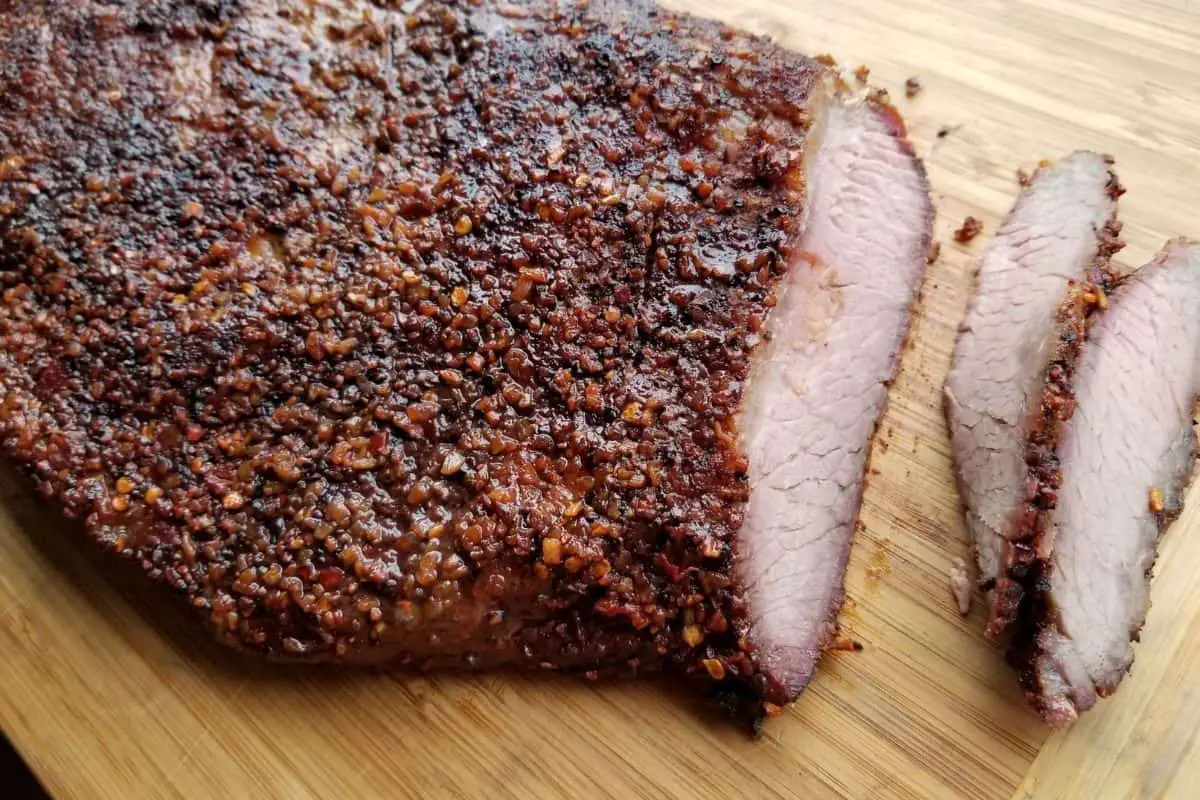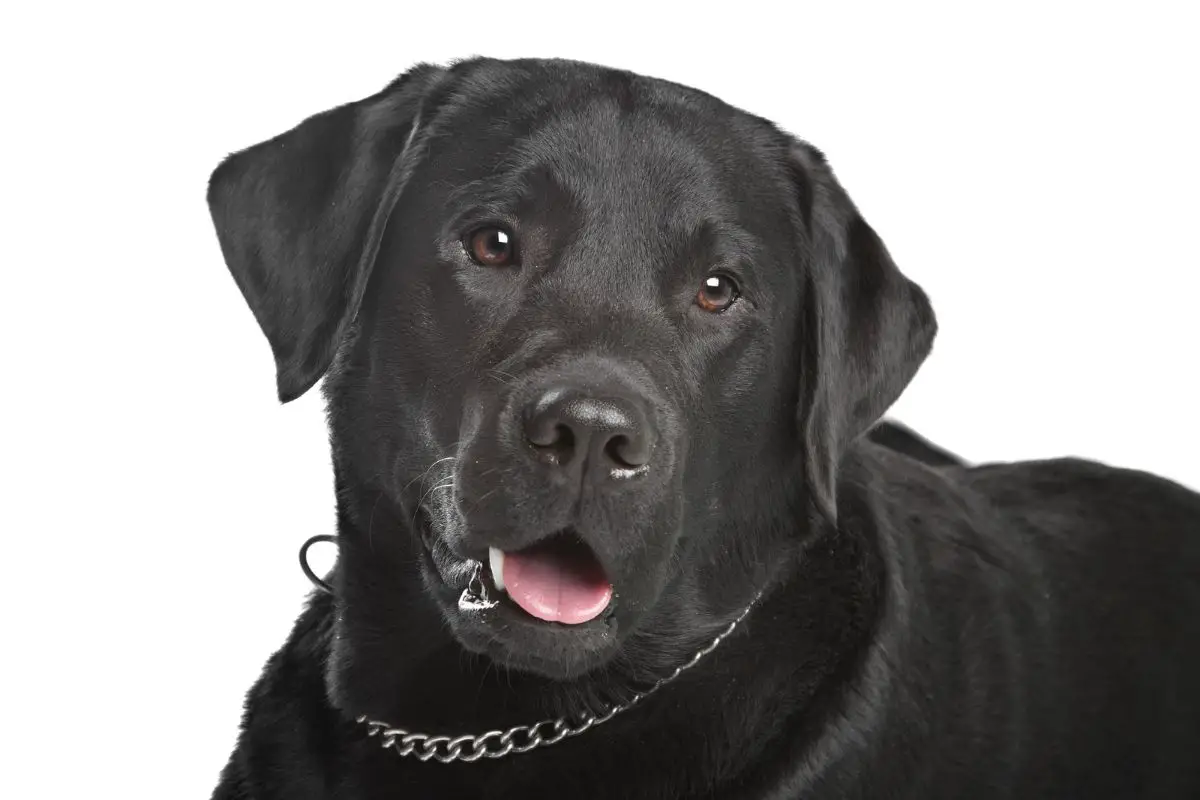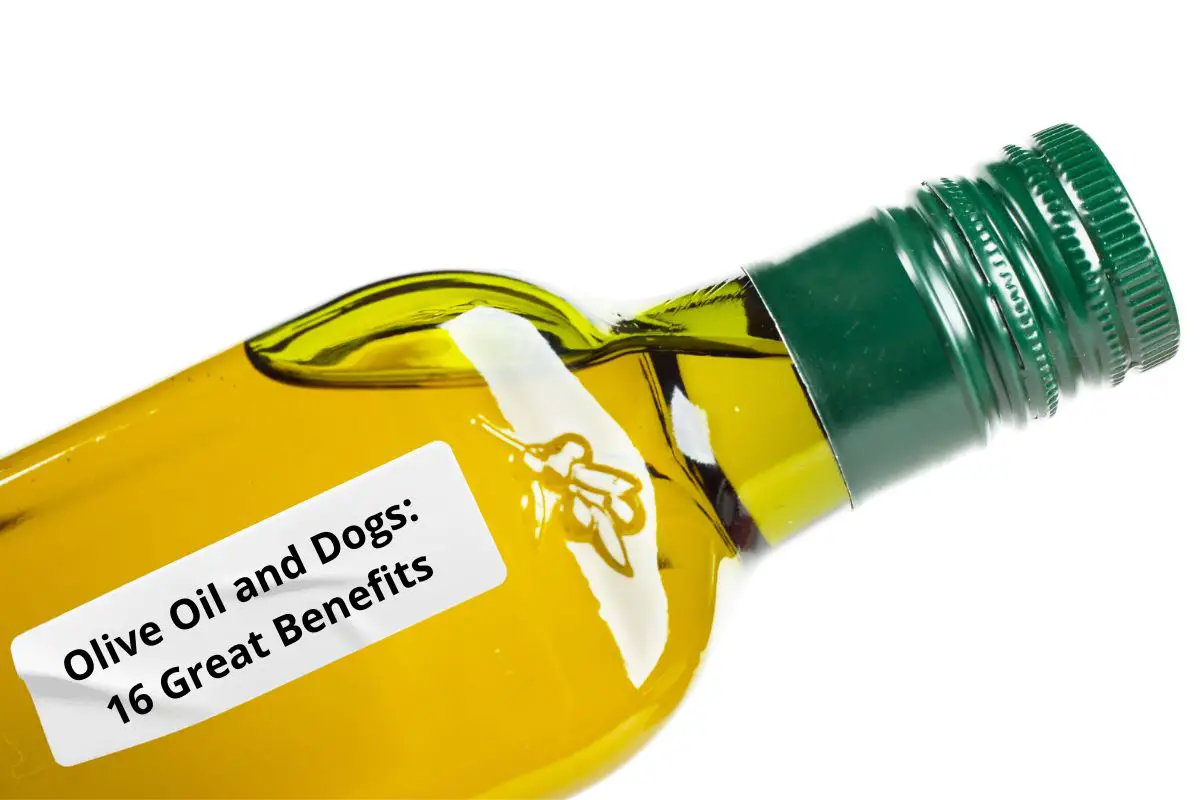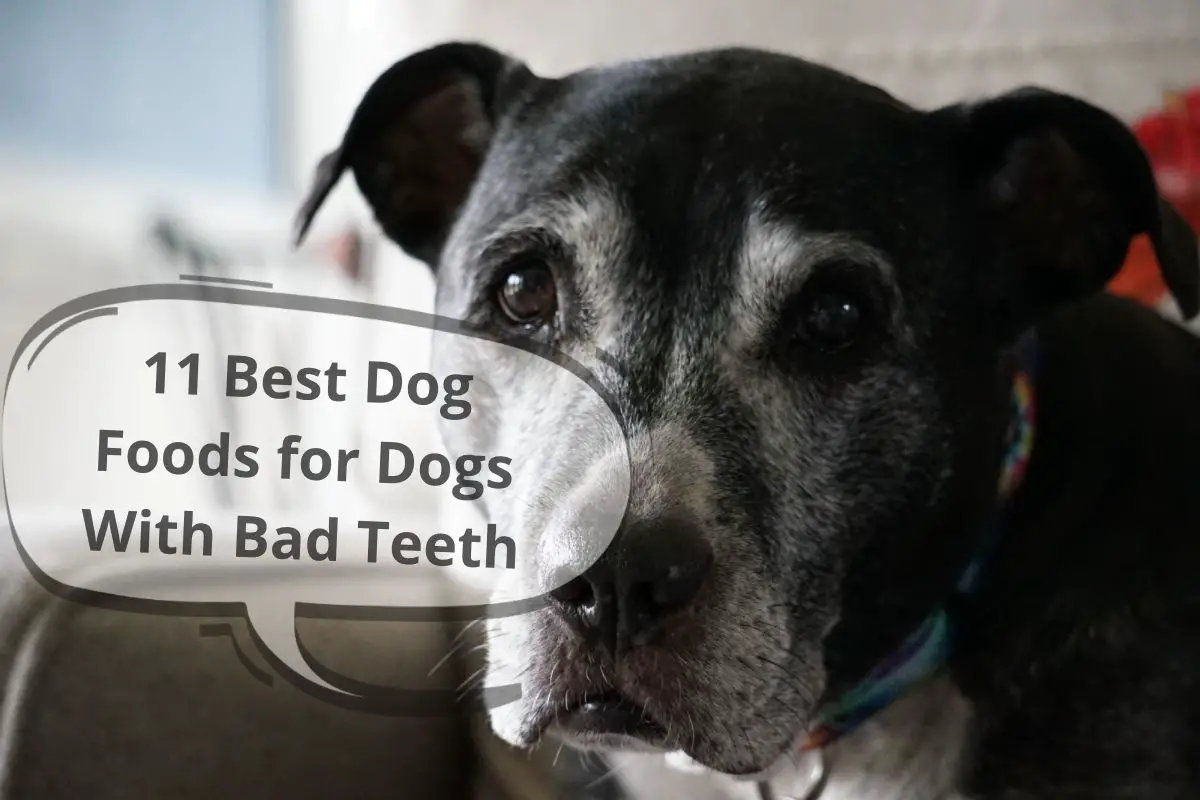This post contains affiliate links.
As a pet parent, it’s natural to have concerns about your four-legged family member’s diet. Since your dog probably wants to participate in all family activities, it might be near impossible to deny them a piece (or several pieces) of smoked brisket. However, most veterinarians and dog experts have their reservations when it comes to feeding dogs smoked meat, which leads to the question, is smoked meat like brisket bad for dogs?
Smoked meat like brisket is bad for dogs because smoked meats usually rely on rub ingredients like salt and spices (which aren’t good for dogs). Most smoked meats contain high levels of fat, which can lead to obesity and issues like pancreatitis when frequently consumed.
Are you curious to learn more about smoked meats and whether they should be included in your pooch’s diet? Read on to learn what the experts have to say about feeding dogs smoked meat like brisket.
Table of Contents
Are Smoked Meats Risky for Dogs?
Owning a dog is a truly rewarding experience. Not only can you interact with your furry companion during training and play, but you also get to develop a deeper connection that transcends the basic human-pet relationship. So as you smoke your well-chosen cut, your furry best friend will most probably be sitting next to you, panting heavily as they demand a slice of the perfectly smoked brisket, just like everyone else in the family.
According to a PetMd article on dietary reactions, most dogs tend to develop gastrointestinal reactions when fed foods that aren’t ideal for their digestive system. As renowned vet Dr. Jennifer Freeman advises, human food shouldn’t be considered safe for dogs because dogs have a different metabolism from that of humans.
Your dog is incapable of processing foods that your digestive system can easily digest. As a result, pet parents are highly advised to refrain from feeding dogs human food as doing so can end up stressing the dog’s digestive system.
Therefore, before you decide to give in to your dog’s demands and cut them a thick slice of that brisket, think about how the meat can impact their metabolism. In the next section, we’ll provide an in-depth discussion of some of the main disadvantages of giving your dog smoked meat.
Reasons Why Dogs Shouldn’t Eat Smoked Meat
Before talking about the disadvantages of giving your dog smoked meat, it’s crucial to note that not all smoked meats are bad. On most occasions, the issue lies in the type of meat and the rub ingredients used when preparing the meat for smoking.
Below are some of the disadvantages of giving your canine companion smoked meat like brisket.
Smoked Meat Can Lead to Sodium Poisoning
Smoked meats rely heavily on salt as part of the water-soluble rub ingredients. While the excess salt might aid the development of a rich crusty bark on the brisket, it also increases the chances of sodium poisoning in dogs.
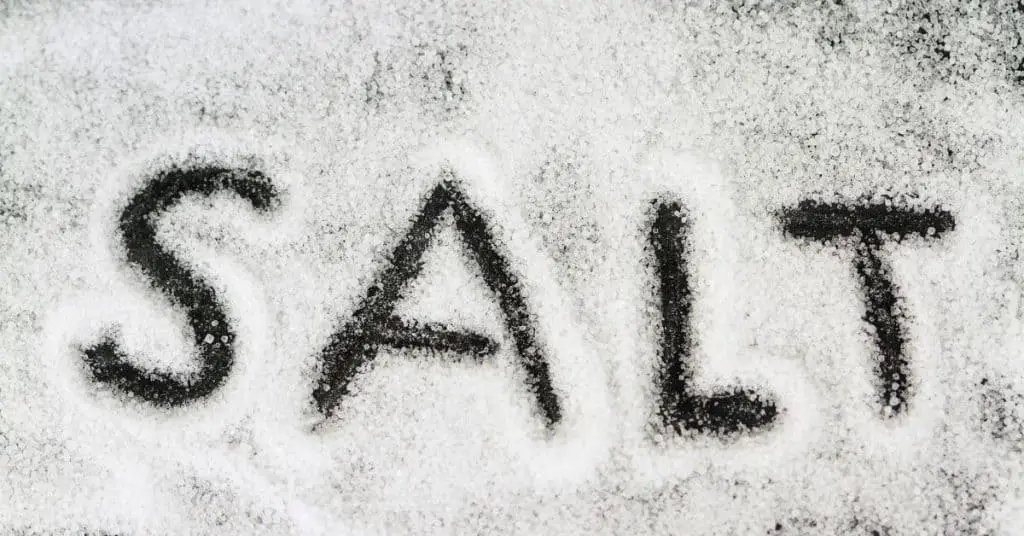
As stated in this salt poisoning article by Wag, excessive consumption of sodium chloride in dogs leads to the drying out of brain cells because the brain cells respond to the excess salt in the bloodstream by releasing water to dilute the salt. Although giving your pup water might help ease down salt poisoning symptoms, they might still exhibit symptoms like confusion, fast heartbeat, and difficulty in breathing.
The MSD Veterinary Manual further adds that dogs respond differently to salt poisoning. Older dogs are at increased risk of dying from salt poisoning, especially if they consume large amounts of salt in a short sitting.
Some of the symptoms to be on the lookout for include:
- Seizures
- High fever
- Lack of energy
- Nausea
- Respiratory distress
- Loss of appetite
- Muscle spasms
- Tummy pains
- Vomiting
- Tongue swelling
- Weakness
- Walking as if intoxicated
If you must give your dog a slice of the finely smoked brisket, it’s best to check on the salt content. Taste the meat, and if the juicy, inner meat is a tad too salty, then you should steer clear of sharing the meat with your dog. But if the salt level is manageable, you can rinse the meat in water to reduce its overall salt quantity.
In case you forget and give your paw-pal a chunk of extra salty brisket, you should provide them with enough drinking water. To reduce the chances of fatal outcomes, dog care experts recommend taking your dog for a consultation at the local vet, especially if the symptoms become worse.
Most Smoked Meats Contain Spices
As most enthusiasts of smoking meat will admit, the thicker the bark, the tastier (and better) the brisket. But to get a good bark when smoking meat, one must put in the work, especially when it comes to the rub preparation. Most people prefer using spicy ingredients to add a bit of flavor and thickness to the rub.
While the blend of different spices and ingredients in your rub might make the brisket tastier, it also makes the cut of meat inappropriate for your furry best friend. Put simply, dogs and spices don’t get along too well, so you should try as much as possible to avoid giving your dog spicy food.

Dr. Andrea Tu, a USDA-accredited veterinarian, advises that dog owners should avoid feeding their pets spiced foods because dogs don’t have as many taste buds as humans, meaning they won’t find any value in extra spiced foods.
Some spices used in rubs contain additives and preservatives that might strain your dog’s digestive system. Although some dogs might appear to love spiced foods, it usually does more harm than good, especially when given to dogs with sensitive stomachs.
When dogs consume spicy foods, they’ll more often than not develop gastrointestinal issues such as gas, diarrhea, excess thirst, and pain resulting from inflammation. As a result, you should avoid giving your dog brisket, or smoked meat rubbed in different spices.
Some Rub Ingredients Aren’t Ideal for Dog Consumption
For most people, smoking meat is all about playing with different ingredients from salt and sugar to herbs and spices. However, some rub ingredients like onion or garlic might not be ideal for dogs.
Although ingredients like garlic and onion might not be added directly to rubs, they might come as part of your spice’s ingredients. The Merck Veterinary Manual states that garlic, onions, and other members of the allium family contain thiosulfate, which, despite not being toxic to humans, can harm dogs if consumed in large amounts.
AKC further adds that thiosulfate causes oxidative damage to red blood cells, which can result in hemolytic anemia. If your dog consumes brisket with high onion and garlic levels, they might develop gastrointestinal upset, which can lead to loss of appetite, diarrhea, vomiting, and abdominal pain.
You should avoid feeding your dog brisket that’s not home-smoked because doing so will help reduce the chances of allergic reactions or serious gastrointestinal upset. When buying ingredients for your rub, you’ll want to check the ingredients list to ensure you get products that don’t contain potential allergens.
Fatty Meats Can Lead to Pancreatitis
According to Veterinarian Dr. Andrea Tu, “Dogs that consume diets with high-fat content have increased chances of developing pancreatitis.” The vet further adds that dogs shouldn’t be fed table scraps or greasy ‘people food.’
Stats on pancreatitis in dogs show that most dogs develop the condition when fed people food. While not all ‘people food’ is bad for dogs, those with excessive fat or grease should be avoided if you don’t want to overwhelm your pup’s digestive system.
The risk with smoked meats like brisket is they usually contain large amounts of fat. Therefore, if you must give your dog a slice of the brisket, it’s advisable to cut off the fatty parts or at least give them the parts with as little fat as possible.
Try as much as possible to avoid giving your dog smoked brisket frequently. Giving the fleshy meat once in a while won’t do much harm to your loyal buddy. However, making a habit out of it will definitely increase the chances of developing pancreatitis, and both of you don’t want that.
The Risk of Obesity and Related Illnesses
As Dr. Jennifer Freeman highlights, dogs, especially the relatively inactive breeds, can easily develop obesity when consuming foods high in fat content. Since brisket doesn’t rank high in the list of healthy human foods, giving your dog a thick juicy piece won’t do him much good.
A recent VCA Hospital article concluded that fat tissue is harmful in dogs as it secretes inflammatory hormones that consequently create oxidative stress on a dog’s other tissues, which can contribute to other diseases.
Obesity in dogs is now treated as a chronic condition that can act as a gateway to a host of other diseases, as listed below.
- Different types of cancer
- Heart disease
- Hypertension
- Diabetes mellitus
- Osteoarthritis
- Urinary bladder stones
How To Make Smoked Meat Safer for Dogs
As we’ve observed in the previous section, giving your dog brisket isn’t highly recommended because brisket usually comprises fatty cuts of meat and a combination of spices to add flavor and make the bark richer and thicker.
However, since not all smoked meats are bad for dogs, what can you do to make the meal safer for your canine best friend?
Always Avoid Fat
If you must give your dog smoked meat, it’s best to give them a slice of meat with the lowest amount of fat possible. We’ve already mentioned how excess fat can lead to pancreatitis, obesity, and a variety of cancers.
As a result, the meat you choose to smoke shouldn’t contain high levels of fat. Try giving your dog alternative meats to brisket like smoked salmon if you must keep them on a smoked diet.
Avoid Using Excess Salt as an Ingredient When Smoking
Salt is a basic ingredient when smoking meat for human consumption. While the excess salt won’t do much harm to you, it can poison or even kill your dog if immediate action isn’t taken upon consumption.
Therefore, if you must smoke a piece of meat for your dog, it’s best to avoid using salt as a key part of the rub ingredients. Try using low-to-moderate amounts of salt when smoking meat for your dog.
Avoid Excess Spices
Again, dogs and spices don’t get along too well, so you should avoid using spices in your dog’s food. Smoking meats like fish and chicken with a lot of spices not only increases the chances of allergic reactions for your dog but also exposes them to the risk of poisoning and even death.
Try as much as possible to limit the usage of spices when preparing meals for your dog. The fewer spices you use, the lower the risk of your dog developing allergic reactions or diet-related complications. But if you must add spices to your dog’s food, you’ll want to check the ingredients list and also consult with your vet before including a foreign ingredient in your dog’s recipe.
Smoke Your Dog’s Meat Separately
As a rule of thumb, you shouldn’t cut your dog’s meat from the large family brisket. If they must eat smoked meat, then prepare their food separately to avoid using any potentially harmful ingredients used in human food.
Smoking your dog’s meat separately means they won’t be at an enhanced risk of consuming excess salt, spices, and those extra-fatty cuts.
Ensure the Meat Is Properly Smoked
Besides the risk of sodium poisoning, obesity, pancreatitis, and other diet-related illnesses, dogs consuming smoked foods are also at increased risk of coming into contact with harmful bacteria if the meat isn’t well cooked.
Therefore, if you choose to feed your dog smoked meat, then allow the meat to cook well, which means you might have to wait for several hours before cutting your dog a slice since meat should always be smoked for extended periods.
Regulate Your Dog’s Consumption of Smoked Meat
“All dogs, regardless of age, size or breed, need a consistently balanced meal at all times,” says dog nutrition expert Dr. Andrea Y. Tu. As a result, you should aim to feed your dog a balanced diet and not just chunks of smoked meat whenever the opportunity presents itself.
Ideally, dogs should consume measured amounts of meat since excess meat can lead to medical complications and increased risk of obesity. Therefore, try as much as possible to give your dog smoked meat in small amounts. Too much meat in one sitting can lead to gastrointestinal complications, and you don’t want that for your furry best friend.
What Should You Do When Your Dog Reacts to Smoked Meats Like Brisket?
In case you gave in to the temptation and fed your dog a slice of smoked brisket only for them to develop a reaction, then it’s best to act immediately to reduce the chances of worsened outcomes.
Below are tips to observe when your dog reacts to smoked meats, as advised by Petsman veterinarian Jennifer Freeman.
Give Your Dog Enough Water To Drink
Dogs respond to excess salt in the bloodstream by drinking water. Therefore, if your dog consumes smoked meat with excess salt, it’s advisable to give them enough water to drink. The trick is to keep a bowl of water close to where they’re eating if you suspect the meat might have excessive salt content.
Check for Symptoms of Salt Poisoning
Your dog will exhibit symptoms like lack of energy, loss of appetite, nausea, high fever, and severe tummy pains if they consume too much salt. Therefore, after giving your dog brisket or other types of smoked foods, be on the lookout for the signs and symptoms of a reaction,
Contact Your Vet
The last thing you want to do is home treat your dog when they’re reacting from the consumption of spicy, extra fatty table scraps. While it’s advisable to check for symptoms of distress and discomfort, leaving diagnosis and treatment to the experts is highly recommended. Therefore, once the signs of distress become apparent, you’ll want to take your canine companion to the vet as quickly as possible.
FAQs About Meat Consumption in Dogs
Should I Allow My Dog To Consume Raw Meat?
Dr. RuthAnn Lobos, a lead veterinarian at Merrick Petcare, strongly advises against giving dogs raw meat. Not only is raw meat difficult for dogs to digest, but they’re also likely to contain harmful bacteria like E. coli, listeria, salmonella, and more.
An FDA study concluded that the bacteria found in raw meats could also be passed to humans, which explains the importance of administering meats cooked up to a safe temperature. Dog owners or their family members can come into contact with the harmful bacterial either when handling the raw meat, cleaning feces or when interacting with the dog and touching contaminated surfaces.
Is It Safe for Dogs To Consume Smoked Meat?
According to an AKC article on human foods that dogs shouldn’t eat, pet parents are advised to avoid feeding table scraps to their dogs. While your dog will comfortably enjoy a thick slice of brisket, doing so might not be in his best interests because most briskets are smoked using potentially harmful ingredients.
Therefore, as Dr. RuthAnn Lobos advises, it’s best to avoid feeding dogs smoked meats. But if you must feed your pup smoked meat, then you should choose the less fatty cuts of meat and ensure you use rub ingredients that aren’t harmful to your dog.
Are Barbecue Foods Safe for Dogs?
In her discussion of safe barbecue foods, Dr. RuthAnn Lobos highlights that not all barbecue foods are safe for dogs. The first rule is to give dogs boneless cuts of meat with as little fat as possible.
You should also ensure that the meat is properly cooked when barbecuing since an improperly cooked piece of meat will pose a health threat to your dog. You can also give your dog grilled meat and fish, provided they don’t contain those potentially harmful bones. Grilled veggies like courgette and sweet potatoes are also ideal for dog consumption.

However, you should avoid giving your dogs unsafe BBQ foods like kebab sticks, ribs, and bones, which are a choking hazard, corn on the cob, and ingredients like garlic, scallions, shallots, and onions.
Important Diet Tips To Consider for Your Dog
Unfortunately, maintaining healthy diets for dogs isn’t as simple as most of us would like. Below are some important vet-recommended tips to observe when looking to feed your dog a healthy diet.
Commercial Dog Foods Are Highly Recommended
In a WebMD article on dog food choices, the website recommends feeding your dog commercial dog foods. On almost all occasions, these dog foods contain a healthy blend of meat, veggies, fruit, vitamins, and essential minerals. Commercial dog foods are easy to feed to your dog and won’t need you to mix or balance ingredients on your own.
Check on Labelling
The American College of Veterinary Nutrition advises that pet parents should choose the right food depending on the dog’s life stage. You should also check the dog food’s package for an Association of American Feed Control Officials (AAFCO) statement to prove the food is complete and balanced.
Stick to Solid Feeding Routine
Similar to humans, dogs are predisposed to a host of potentially serious diet-related conditions. Due to this, pet parents should maintain consistent feeding schedules. Aim to feed your dog only during meal times to minimize the risks of obesity and other health complications, which means you shouldn’t give your dog brisket or other smoked delicacies. Instead, ensure your dog has their own snack to feed on when the entire family is having brisket.
Contact Your Vet
Contacting your vet is a great way to ensure your dog consumes a healthy diet and stays away from the treatment table. Ideally, you should always contact your vet before changing your dog’s diet.
Never attempt to feed your dog a raw diet without first seeking diet assistance from a trusted vet because raw diets aren’t easy to administer and often work best when taken together with supplements.
Wrapping Up
As we’ve established throughout the article, most experts will advise against giving dogs smoked meat like brisket. While a small cut won’t do much harm, feeding smoked meat repeatedly can increase the chances of obesity or pancreatitis, especially when dealing with extra fatty cuts of meat.
Smoked meats are also bad for dogs due to the high spice and salt content found in the rub. Most spices contain ingredients that can cause severe reactions in dogs. Therefore, it’s best to avoid giving dogs smoked meat, especially if the meat was meant for human consumption.
Related Articles
- Can Dogs Eat Raw Pork? (We Ask the Experts)
- Can Dogs Eat Caramel? (We Ask the Experts)
- Can Dogs Eat Chestnuts? (Is it Safe?)
- Can Dogs Eat Chicken Feet? (We Ask the Experts)
- Can Dogs Eat Cilantro? (We Find Out)
Sources
- Cuteness: What Are the Effects of Feeding Smoked Meats to Dogs?
- K9 Magazine Free: Can Dogs Eat Brisket [2021] Safe or Bad for Puppies to Have Smoked?
- Canine Journal: What Can Dogs Not Eat? Lists Of Safe & Toxic Foods For Your Dog: Fruits, Vegetables, Nuts, Human Food, Fish, Meat, Bones, Etc.
- NBC News: The best dog food, according to experts and veterinarians
- AKC: Can Dogs Taste?
- Pet Coach: 6 BBQ Foods That Are Dangerous for Dogs
- Paw Tracks: Should Dogs Eat Spicy Food?
- AP News: Pet Nutrition 101
- VCA Hospitals: Obesity in Dogs
- Hill’s Pet: Can Dogs Eat Spicy Food?
- VCA Hospitals: Pancreatitis in Dogs
- Hill’s Pet: 5 Human Foods that are Dangerous to Dogs
- WebMD: Best Ways to Feed Your Dog
Mrdogfood.com is a participant in the Amazon Services LLC Associates Program, an affiliate advertising program designed to provide a means for sites to earn advertising fees by advertising and linking to Amazon.com. We also participate in other affiliate programs which compensate us for referring traffic.

